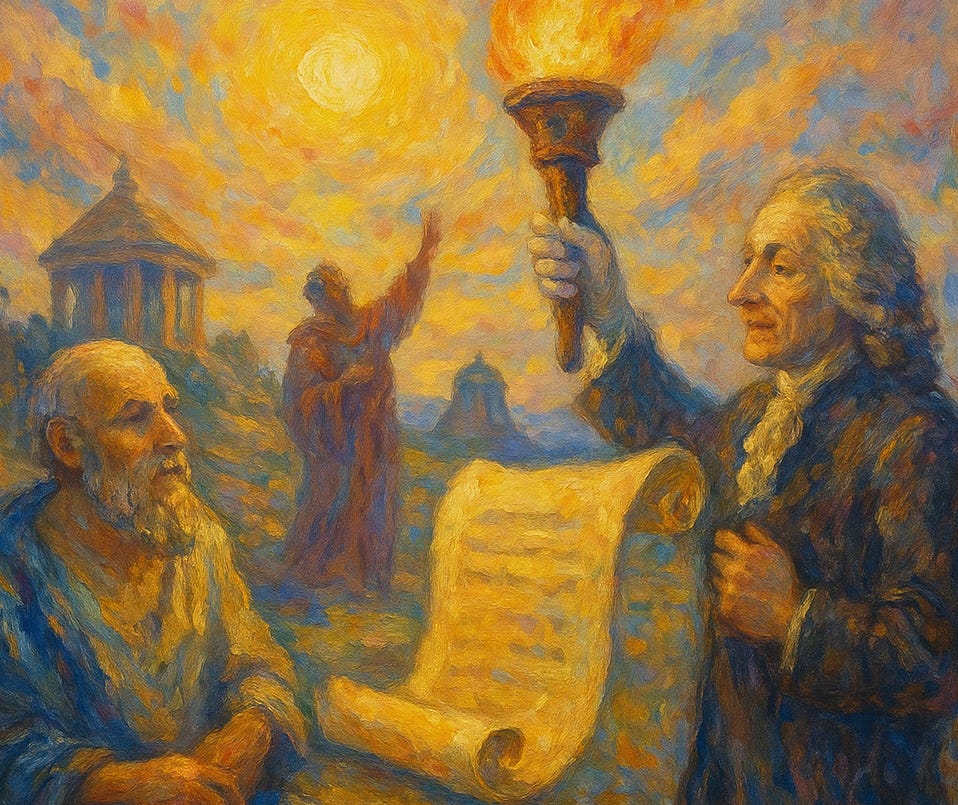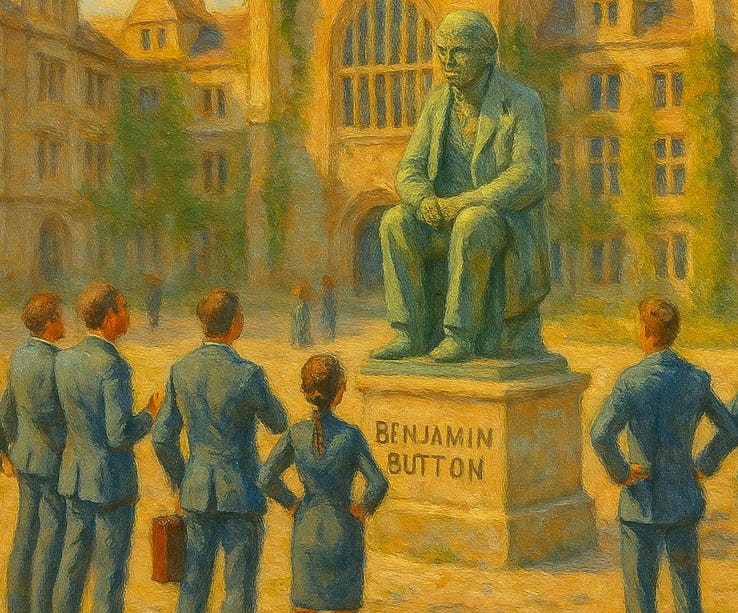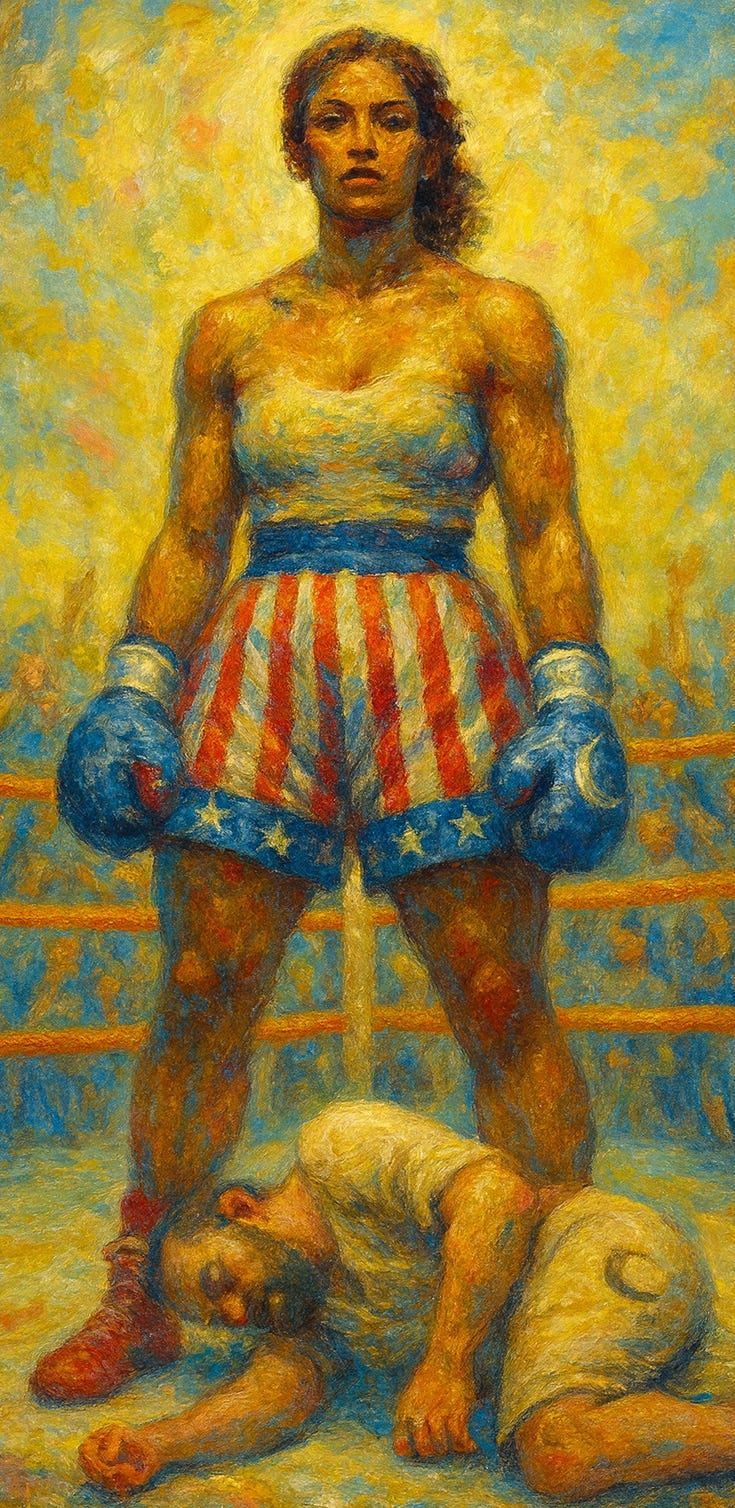The Knockout Blow
Why the Hamas Charter Lies Bloodied on the Canvas of History - A Pugilistic Polemic on Enlightenment Triumph Over Theocratic Tyranny – And the West's Suicidal Sympathy for the Loser
If you believe in the importance of free speech, subscribe to support uncensored, fearless writing—the more people who pay, the more time I can devote to this. Free speech matters. I am a university professor who was just fired for criticising Hamas - so I am not speaking from the bleachers.
Please subscribe to receive at least three pieces /essays per week with open comments. It’s $6 per month, less than USD 4. Everyone says, "Hey, it’s just a cup of coffee," but please choose my coffee when you come to the Substack counter.
Cheers.
Judging by the “Intifada now!” chants and the street‑theatre tantrums of Western undergraduates — not to mention their keyboard‑warrior cousins with Wi‑Fi and half a political science degree — it’s clear that many in the West, wittingly or otherwise, are now riding shotgun with Hamas, especially, for reasons that remain a Celtic mystery, the Irish.
The logic is brutally simple: the enemy of their enemy is their friend. And because America and Israel have been cast as the twin Satans of the global morality play, Hamas and their fellow travellers become the plucky underdogs.
It’s a strange spectacle: privileged Westerners earnestly cosplaying as resistance fighters for a group that, if handed the keys to their apartment, would throw them off the balcony for the crime of existence.
Many of these worthies pretend to occupy a kind of ideological purgatory — the Switzerland of moral clarity — where they can declare themselves “pro‑Palestinian but not pro‑Hamas.” How charming.
Unfortunately, the Palestinians themselves have missed the memo. Poll after poll shows Gazans and West Bankers openly celebrate October 7 and cheer the prospect of erasing their Jewish neighbours. They do not want coexistence. They want the Jews gone or dead — preferably both.
But Western useful idiots — Lenin’s phrase fits like a tailored glove — continue to indulge the delusion that they can wave the flag of Western liberal ideals while passively supporting a movement sworn to annihilate everything those ideals represent.
Hamas loathes free speech, women’s equality, secular government, and even music. Yet campus activists chant their slogans between Starbucks runs and Gender Studies seminars. Cognitive dissonance has rarely looked so smug.
So let’s run an experiment.
Forget the hashtags. Compare texts. On one side, the U.S. Constitution — the Enlightenment’s greatest hits album. On the other hand, the Hamas Charter is a medieval fever dream. No spin, no filters, just two documents in the ring. Ding ding.
Round One: Freedom of Speech
Ah, the Hamas charter—a squalid little document, isn't it? Dripping with theocratic bile, it decrees that any whisper of dissent is not merely disagreement, but outright heresy.
Free speech, in their enlightened lexicon, translates to the liberty to nod in fervent agreement or take a terminal dive headlong into the pavement below. At least give them this: they're refreshingly candid about their contempt for discourse. No mealy-mouthed pretensions to tolerance here; they broadcast their hatred for dialogue like a muezzin calling the faithful to prayer, or perhaps more aptly, to the stoning pit.
It's the honesty of the fanatic, unadorned and unashamed, a stark reminder that in the fevered minds of such zealots, conversation is not a bridge but a battlefield where only submission survives.
But let us pause to consider the fragile miracle we're defending—or rather, the oddity we're presuming to be eternal. Free speech, that supposed bedrock of civilised exchange, is no ancient heirloom handed down from the dawn of humanity; nay, it's a precocious upstart, a late-bloomer in the grand, blood-soaked pageant of our species' history.
For millennia, the human story has been one of muzzled tongues and crushed inquiries, where the powerful—be they kings, priests, or tribal chieftains—treated words as weapons to be confiscated at will.
Think of Socrates, that gadfly of Athens, forced to swig hemlock in 399 BC not for any crime of action, but for the sin of corrupting the youth with his relentless questioning, his impudent demand that men examine their lives rather than parrot the pieties of the polis.
Or Galileo, in the seventeenth century, hauled before the Inquisition's velvet-gloved thugs and compelled to recant his heliocentric heresy under threat of the rack, because the Church's fragile cosmology couldn't withstand the telescope's gaze.
This is the norm, you see—the historical default setting of our kind.
From the pharaohs of Egypt entombing dissenters with their secrets, to the medieval burnings at the stake for witchcraft or blasphemy, to the imperial censors of ancient China who buried scholars alive for unauthorised scrolls, suppression has been the rule, free expression the rare aberration.
It wasn't until the Enlightenment's flickering torch—lit by the likes of Voltaire, who thundered "I disapprove of what you say, but I will defend to the death your right to say it," though he never quite said it that way— that this notion began to take root.
The American Founders, those deist revolutionaries, enshrined it in their First Amendment in 1791, a mere blink ago in evolutionary terms, as a bulwark against the tyrannies they'd fled.
Free speech is the oddity, the historical outlier, a delicate flower blooming amid thorns of conformity and fear. In the vast roll of humanity's ledger, it's the exception that proves the rule of repression, a hard-won anomaly that demands eternal vigilance lest it wither under the boot of the next Hamas, the next inquisitor, the next self-appointed guardian of truth.
To champion it is to defy the gravitational pull of our baser instincts, and in the face of charters like theirs, we must rant all the louder, for silence is the true plummet.
The U.S. Constitution, meanwhile, throws a parade for disagreement. It doesn’t just tolerate dissent; it practically encourages it.
Criticise Congress? Shout from the rooftops! Think the President is an incompetent clapping seal? Print pamphlets, start a protest, run for office. No divine wrath awaits you. The only risk is carpal tunnel from writing too many op‑eds.
Round Two: Women
Hamas casts women as baby‑factories for martyrs — noble wombs whose sacred duty is to raise fighters.
Meanwhile, the Constitution didn’t originally mention women at all — but it built the scaffolding for progress. Over time, through amendments and activism, women won the vote, careers, and legal equality. Slow? Yes. But a system that can admit fault and evolve beats a theocracy that romanticises child soldiers and treats daughters as disposable assets in a family jihad.
It's not mere oppression; it's a vile caricature of maternity, where a woman's pinnacle of achievement is to swell the hordes of the deluded and the doomed, her flesh a mere depot for the jihad's ravenous maw.
This isn't some dystopian fiction like The Handmaid’s Tale, scribbled in the fevered imagination of a novelist; no, it's the brutal reality of the 1450s dragged kicking and screaming into the modern age, now armed with Kalashnikovs and rocket launchers.
And yet, observe the exquisite hypocrisy of those Western activists—those self-anointed guardians of sensitivity who froth at the mouth over the slightest microaggression in a university seminar or a corporate memo—suddenly struck dumb with moral amnesia when confronted with this medieval barbarity.
They mumble platitudes about "all cultures being equally valid," as if relativism were a shield against the screams of the oppressed, a convenient fog to obscure the bloodstained truth that some "cultures" are little more than organised sadism masquerading as piety.
But let us not delude ourselves into thinking that women's rights—or any rights, for that matter—sprang fully formed from the ether, a natural endowment bestowed by some benevolent cosmic force.
No, these are man-made constructs, forged in the crucible of struggle, hammered out against the anvil of millennia where women were chattel, broodmares, or worse: invisible footnotes in the annals of power.
For most of human history, across empires and epochs, women were denied agency as a matter of course—barred from property, education, or even the basic autonomy over their bodies.
In ancient Athens, cradle of democracy, women were sequestered in the gynaeceum, their voices silenced in the agora where "free" men debated. The Romans, those paragons of law, treated wives as legal appendages to their husbands, disposable in divorce or death. Medieval Christendom, with its witch-hunts and inquisitions, burned women at the stake for daring to heal or question.
At the same time, Islamic caliphates codified polygamy and veiling as divine mandates, reducing half the population to shadows behind lattices. Even in the so-called enlightened West, it took the blood and sweat of suffragettes—those indomitable warriors like Susan B. Anthony and Emmeline Pankhurst, chaining themselves to railings, enduring force-feedings in prison—to claw the vote from reluctant patriarchs in the early twentieth century.
The right to work, to control reproduction, to escape abusive marriages—these were not gifts from nature but prizes won through relentless activism, court battles, and legislative wars, often against the tide of "tradition" that deemed such demands unnatural or ungodly.
All rights are artificial edifices, built by human hands from the rubble of injustice; they don't "exist naturally" any more than bridges span rivers without engineers. They require constant defence, lest they crumble under the weight of complacency or the assault of regressive zealots.
Meanwhile, the American Constitution, that flawed but flexible parchment, didn't deign to mention women at all in its original draft—treating them as spectral presences, absent from the "We the People" who mattered. Yet it erected a scaffolding for progress, a framework that could bend without breaking.
Over decades, through amendments like the Nineteenth Amendment in 1920, which granted suffrage, through the activism of the civil rights era and the feminist waves that followed, women wrested the vote, careers, reproductive rights, and legal equality from a system willing to admit its faults and evolve. Slow?
Agonizingly so, stained with the compromises of slavery and segregation. But compare this to the rigid theocracy of Hamas, where fault is heresy, evolution is apostasy, and the romanticisation of child soldiers and disposable daughters is etched in immutable stone.
A society that can self-correct, however imperfectly, towers over one that glorifies its chains as divine jewellery. To pretend otherwise is not tolerance; it's treason against humanity itself.
Round Three: Religion
Oh, spare me the sanctimonious drivel about "diversity" and "inclusion" from the globalist gasbags who wouldn't know genuine tolerance if it bit them on their taxpayer-funded derrières.
Hamas's approach to faith: one God, one dog-eared rulebook scribbled in the seventh century, and a swift beheading for any poor sod who dares to apostatise. Interfaith dialogue?
Sure, if by "dialogue" you mean a one-way harangue that culminates in your forced conversion or a shallow grave. These are the chaps who make the Spanish Inquisition look like a polite tea party debate society. And let's not forget the twelve—count 'em, twelve—countries where abandoning Islam still earns you the death penalty, from stoning to hanging, all while their oily diplomats swan about the United Nations, hectoring Canada on "human rights" with straight faces.
Meanwhile, ex-Canadian PM Justin Trudeau, that preening peacock in his rainbow socks, beams like a lobotomized labradoodle1, apologising for the crime of Canada's existence and begging for more lectures from these medieval throwbacks.
As for apostasy laws today, they're alive and kicking in a rogue's gallery of about a dozen nations—Afghanistan, Iran, Malaysia, the Maldives, Mauritania, Nigeria, Qatar, Saudi Arabia, Somalia, the United Arab Emirates, Yemen, and even Brunei, which gleefully added the death penalty for leaving Islam to its sharia playbook as recently as 2019, because nothing says "progress" like executing folks for changing their minds about God.
Sure, executions are rare these days, thanks to international pressure and the occasional bout of PR-savvy restraint. Still, the laws squat there like a loaded gun on the table, ready to blast away at any ex-Muslim who dares to breathe freely.
And Hamas? Oh, their 1988 Covenant doesn't spell it out in neon letters. Still, it's drenched in theocratic bile that views any deviation from the faith as a threat to the ummah, with secularism dismissed as a loser’s game and peace only possible under Islam's iron fist—implying that apostates, those who abandon the fold, deserve the traditional sharia chop, just like in the good old days of the Prophet's companions.
Their "humanistic" movement tolerates other religions only if they bow low and stay in line, but turn your back on Allah? That's heresy, bub, and in Gaza under their watch, it's a one-way ticket to the executioner's blade or a mob's fury.
Contrast that with the U.S. Constitution, that magnificent bulwark against theocratic thuggery: worship one god, twenty gods, or a golden guinea pig born in Vulcan, Alberta—the state couldn't give a flying fig leaf.
It's Enlightenment pluralism at its finest: believe whatever batty nonsense floats your metaphysical boat, any sky daddy is fine, just so long as you don't harm your neighbour or blow up his barn in the name of divine wrath.
That's actual tolerance, you see—not the simpering, selective variety peddled by the multicultural mafia, but the real McCoy, where freedom means freedom, not coerced conformity under threat of the sword.
And while we're dismantling the fairy tales, let's torch that pernicious myth peddled by apologists and history-revisionists about how lovely the Muslims were to Christians and Jews back in the golden age of Islamic rule—as long as those infidels were content to shuffle along as third-class citizens, forking over the jizya tax like good little dhimmis.
Oh, what a tolerant paradise! Protected people, they called them—ahl al-dhimma—granted the "privilege" of not being slaughtered outright, in exchange for paying this poll tax that symbolised their utter subjugation, exempting them from military service because they didn’t trust them.
No building churches taller than mosques, no ringing bells too loudly, no proselytising, and God forbid you criticise the Prophet—restrictions piled on like so many chains. At the same time, the jizya was collected with ritual slaps to the face in some eras, just to drive home the point that you were dirt beneath the believer's sandal.
Sure, it was better than the pogroms of medieval Europe at times, but that's like praising a prison for having slightly better gruel than the gulag next door. This wasn't equality; it was managed inferiority, a contract of submission where non-Muslims bought their survival at the price of dignity, and any uppity dhimmi who forgot his place faced the sword or expulsion.
Hamas and their fellow theocrats don’t just hark back to this so‑called “glorious” model — they clutch it like a drunk clings to a barstool, insisting it’s harmony when in fact it’s hierarchy, submission dressed up as sanctity. They romanticise the iron fist of holy writ: obey or be obliterated.
And yet, here in the coddled West, we grow misty‑eyed about “religious liberty” as though it were some primordial birthright, a natural spring bubbling eternally beneath human history.
It is nothing of the sort. It is a freak accident, a fragile Enlightenment experiment. We forget this at our peril — and Hamas, with its medieval appetites, is only too eager to remind us what the default setting of human history looks like: theocracy with a sword in one hand and a fatwa in the other.
The right to freely worship—or not worship at all—is a rare jewel in the blood-soaked junkyard of civilisation's history, a hard-fought prize wrenched from the jaws of fanatics and tyrants after centuries of slaughter. For most of our sorry species' timeline, faith wasn't a personal choice; it was a state-mandated straitjacket, enforced by fire and sword.
Look no further than the Wars of Religion that ravaged Europe in the sixteenth and seventeenth centuries—the endless butchery between Protestants and Catholics, from the St. Bartholomew's Day Massacre in 1572, where Huguenots were hacked to pieces in their thousands by Catholic mobs in Paris, to the Thirty Years' War that turned the continent into a charnel house from 1618 to 1648, leaving millions dead in the name of whose version of the Eucharist was the "true" one.
Armies rampaged, cities sacked, peasants starved, all because popes and princes couldn't abide the idea of letting folks pray as they pleased without the state's boot on their necks.
It took the Enlightenment's clear-eyed sceptics—Voltaire mocking the absurdities, Locke arguing for the separation of church and state—to drag us kicking and screaming toward something resembling sanity, culminating in that First Amendment miracle in 1789.
Even then, it was no picnic: witch trials in Salem, pogroms against Jews, forced conversions of natives—the ghosts of intolerance linger. These rights aren't "natural"; they're man-made fortifications, built on the bones of the persecuted, and they demand eternal vigilance against the likes of Hamas, whose model isn't tolerance but submission, pure and simple.
To equate the two is not just moral blindness; it's civilizational suicide, gift-wrapped for the barbarians at the gate.
Round Four: Enlightenment vs. Medieval University
Ah, but we in the West, in our sublime arrogance and creeping senescence, no longer value the Enlightenment—that audacious rebellion of reason against the suffocating shroud of superstition and sacral authority—which once armed us with the weapons of empirical inquiry, untrammeled skepticism, and those vital checks and balances to guard against the hubris of kings and clerics alike.
We squander its legacy like prodigal sons, frittering away the hard-won fruits of Voltaire's wit and Locke's logic, allowing our institutions to rot from within under the insidious creep of relativism and rote piety.
The U.S. Constitution, that Enlightenment artefact par excellence, enshrines this rational ethos in its very marrow: a secular charter that separates church from state, fosters free inquiry, and permits the marketplace of ideas to flourish without the censor's blade, ensuring that governance bows to evidence and debate rather than divine diktat.
Hamas's charter, by venomous contrast, is a paean to theocratic absolutism, a document that scorns reason as a satanic snare, empirical truth as infidel illusion, and any check on its holy writ as heresy deserving the sword—demanding submission to a fossilised revelation where questions are quashed and doubt is damnation.
Reason wrenched the Western university from its medieval mire, where once these hallowed halls were little more than echo chambers for religious indoctrination, churning out clerics and scholastics who parsed the scriptures with the fervour of inquisitors, debating how many angels could pirouette on a pinhead while heretics roasted on stakes outside.
Oxford and Cambridge, Paris and Bologna—these were seminaries in all but name, bastions of theological hairsplitting where Aristotle was twisted to serve Aquinas, and any whisper of doubt invited the tender mercies of the rack or the pyre.
It took the likes of Hume and Kant, Diderot and Rousseau, to shatter that pious monopoly, transforming academia into a forge of free thought, where hypotheses were tested against evidence, not scripture, and the pursuit of truth became a secular sacrament, untainted by the incense of superstition.
Hamas, embodying this absolutism in its most virulent form, views reason not as a liberator but as a lethal threat to the faith's fragile edifice, dismissing empirical inquiry as the devil's arithmetic and enshrining in its charter a worldview where education serves only to indoctrinate the masses into eternal jihad, with "freedom" in their universities—if such term applies to their propaganda mills—meaning the liberty to echo the imam's edicts or face excommunication, expulsion, or worse.
It's a stark antithesis to the Constitution's implicit endorsement of intellectual liberty, where the state refrains from dictating dogma, allowing universities to evolve as crucibles of contestation rather than citadels of conformity.
What’s truly astonishing, in this era of self-inflicted amnesia, is how many modern universities—those very progeny of Enlightenment ideals, erected on the rubble of ecclesiastical monopoly—now flirt shamelessly with medieval dogma, preaching rather than teaching, intoning slogans like catechisms rather than subjecting them to the scalpel of scrutiny.
They are a Benjamin Button academy: ageing backwards into superstition, where the once-vibrant pursuit of knowledge devolves into a nursery of nursed grievances and enforced orthodoxies.
Our humanities departments, those self-proclaimed citadels of “critical thinking,” have become inquisitorial tribunals that criminalise criticism itself, purging heretics who dare to offend the sacred cows of the day.
Witness the farce at the University of Guelph, where in July 2025, a professor was fired for the heinous crime of offending Muslim sensibilities by calling Hamas Nazis—a comparison as apt as it is obvious, given the history of the warm hearted embrace between the Muslim Brotherhood and the National Socialists —proving that we're not just regressing, but sprinting headlong into the arms of the censors, where truth yields to tender feelings and academic freedom is sacrificed on the altar of appeasement.
In Canada, that frozen bastion of bien-pensant banality, the NDP schemes to criminalise advocacy for fossil fuels, as if debating energy policy were akin to arson, while the Liberals plot to legislate away “misinformation,” a term so elastic and amorphous it encompasses whatever fleeting hurt the dean’s lounge deems offensive this week—be it climate skepticism, gender heresy, or the unvarnished truth about Islamist barbarism.
This is not enlightenment; it's endarkenment, a voluntary plunge back into the theocratic abyss from which we so laboriously escaped, and it mocks the very foundations upon which these institutions were rebuilt.
To tolerate such rot is to betray the legacy of those who bled for reason; to combat it is the least we owe to the ghosts of Galileo and Spinoza, lest our universities become mere madrassas in tweed, and our constitutions mere parchment shields against the encroaching night of unreason.
Round Five: The Verdict—Ding, Ding, It's Over
“There’s no need to drag this mismatch through twelve weary rounds — by Round Five, the Constitution has already flattened its theocratic opponent, a clean knockout delivered by the very freedoms the other side fears most.”
And now, bloodthirsty crowd baying for more ideological carnage—we come to the final bell in this mismatched bout, where the U.S. Constitution, that heavyweight champion forged in the fires of revolution and refined by the sweat of ceaseless amendment, squares off against the Hamas Charter, a scrawny fanatic in the ring, all bluster and bile, swinging wildly with its promises of no speech unless it's their sanctified screed, no rights unless you're male, Muslim, and marching to the mullah's drum, and no pluralism except the kind that demands abject submission under the boot of theocracy.
The Constitution, by thunderous contrast, jabs with enshrined free speech that echoes through the ages, uppercuts toward evolving equality that has dragged women, minorities, and the marginalized into the light despite the original sins of its drafters, and delivers a knockout hook with the separation of church and state, ensuring that no divine delusion dictates the laws of men.
But oh, the tragedy isn't that we've ceased to appreciate these hard-fought rights, these precious anomalies wrested from history's maw through rivers of blood and ink; no, it's far worse—we've deluded ourselves into believing they're organic, sprouting effortlessly like those picture-perfect roses from the florist's shelf, all dewy and divine, as if they weren't cultivated in the gritty soil of struggle, pruned by the shears of sacrifice, and fertilized by the corpses of tyrants and martyrs.
The U.S. Constitution ain't no gas station bouquet, plucked from a convenience store cooler or conjured in some sterile lab; it was born of deliberate toil, rooted in the Enlightenment's earth, watered by the debates of Madison and Jefferson, and grown amid the thorns of civil war and civil rights marches.
To imagine otherwise is to court catastrophe, for rights untended wither, and freedoms forgotten fade like neglected blooms under the frost of forgetfulness. So pick your corner, you equivocating spectators—spare us the moral contortions of those who profess adoration for the Enlightenment while batting eyelashes at theocrats who would burn its libraries to ash.
There's no neutral ropeside seat here, no Switzerland of the soul, no cosy ideological no-man's-land where one can bleat "pro-Palestinian but not pro-Hamas" without the scrutiny revealing it as the hollow dodge it is, a fig leaf for fellow-travelling with fascism in keffiyeh drag.
The Hamas Charter lies bloodied on the canvas, down for the count, barely wheezing through its fractured fanaticism. To declare this a draw isn't neutrality; it's imbecility, a moral flat-earthism that denies the plain geometry of good versus grotesque.
The ref's hand is raised—the Constitution stands victorious, its muscular frame unbowed. And yet, gaze upon the quad outside the arena: the banners flutter like fools' flags, the slogans reverberate in empty echoes, the useful idiots parade in their blissed-out oblivion, romanticizing a cause that would, without a flicker of hesitation, hurl them from the nearest rooftop the instant their utility expired, their progressive pieties deemed as disposable as yesterday's infidel.
If you found value in this article and wish to support my ongoing work, especially during my 18-month suspension, please consider leaving a tip. Your support helps me continue producing uncensored content on critical issues.
Apologies to dogs.
















This article is now also in Polish: https://www.listyznaszegosadu.pl/notatki/zalalzcie-rekawice-bokserskie-karta-hamasu-kontra-konstytucja-usa
THANKS!
Nice article, but the section on women "winning" the right to vote is a misconception; a majority of women did NOT support the suffrage movement since the right to vote carried certain obligations, like having to serve in the military. The article also neglected to mention that not many men could vote, either. Despite what rights the Constitution gives, many MEN and woman were denied the right to vote, and to suggest that only women were disenfranchised because of the "Patriarchy" minimizes the struggles that men of color, those without land, or from a lower economist status, etc. had to fight to have a say in government.